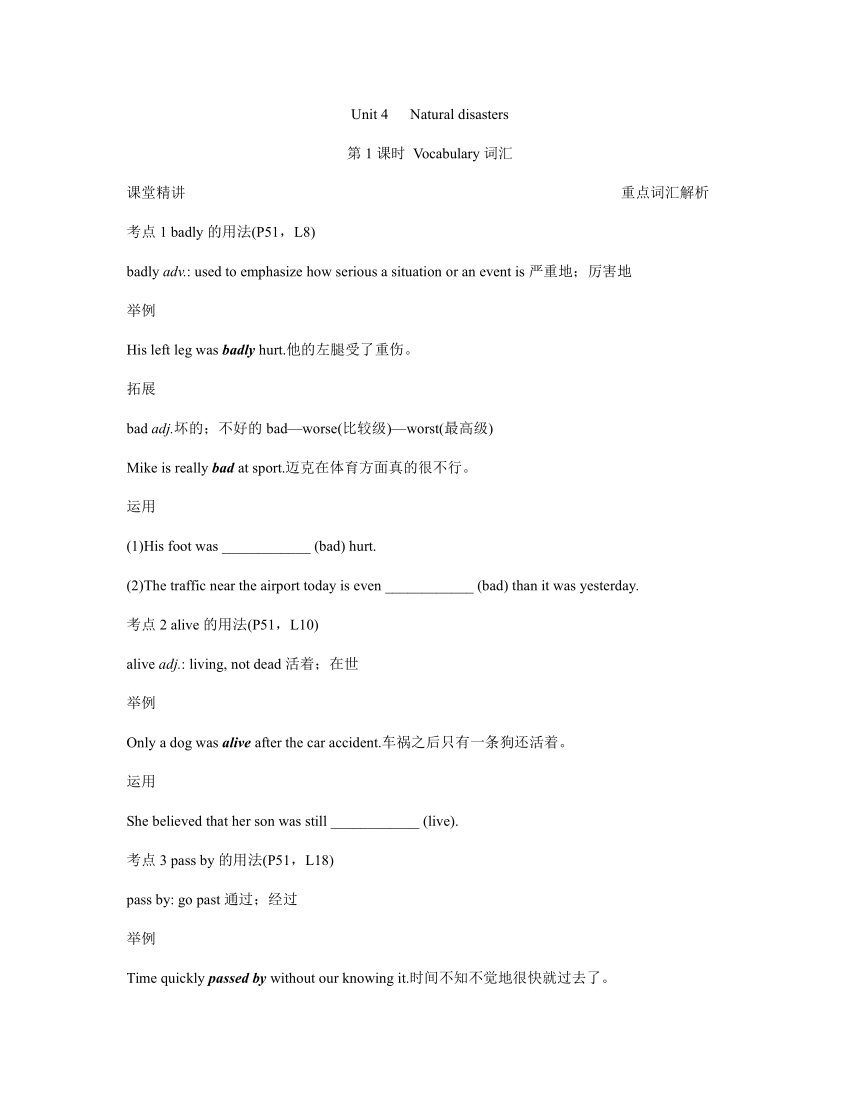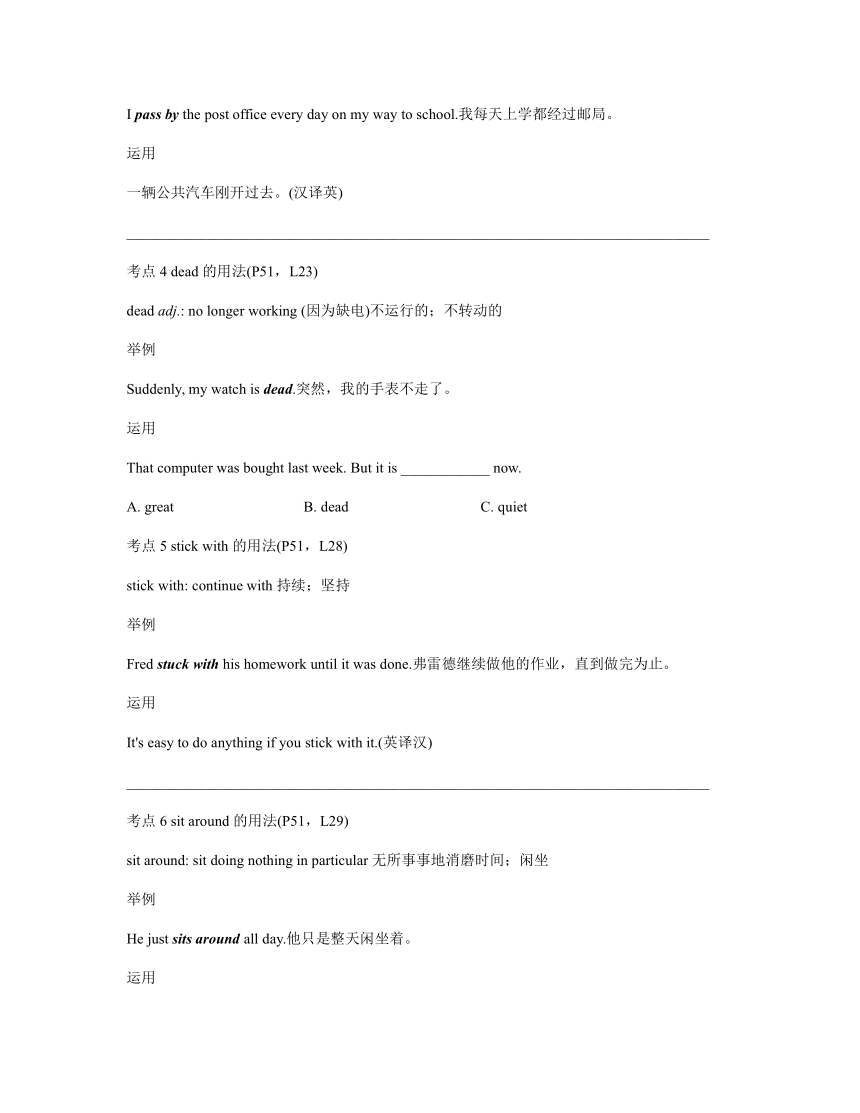牛津版(深圳 广州)英语九下 Unit 4 Natural disasters 第1课时(Vocabulary词汇)导学案(无答案)
文档属性
| 名称 | 牛津版(深圳 广州)英语九下 Unit 4 Natural disasters 第1课时(Vocabulary词汇)导学案(无答案) |  | |
| 格式 | doc | ||
| 文件大小 | 74.5KB | ||
| 资源类型 | 教案 | ||
| 版本资源 | 牛津深圳版 | ||
| 科目 | 英语 | ||
| 更新时间 | 2022-05-31 11:18:04 | ||
图片预览



文档简介
Unit 4 Natural disasters
第1课时 Vocabulary词汇
课堂精讲 重点词汇解析
考点1 badly的用法(P51,L8)
badly adv.: used to emphasize how serious a situation or an event is严重地;厉害地
举例
His left leg was badly hurt.他的左腿受了重伤。
拓展
bad adj.坏的;不好的bad—worse(比较级)—worst(最高级)
Mike is really bad at sport.迈克在体育方面真的很不行。
运用
(1)His foot was ____________ (bad) hurt.
(2)The traffic near the airport today is even ____________ (bad) than it was yesterday.
考点2 alive的用法(P51,L10)
alive adj.: living, not dead活着;在世
举例
Only a dog was alive after the car accident.车祸之后只有一条狗还活着。
运用
She believed that her son was still ____________ (live).
考点3 pass by的用法(P51,L18)
pass by: go past通过;经过
举例
Time quickly passed by without our knowing it.时间不知不觉地很快就过去了。
I pass by the post office every day on my way to school.我每天上学都经过邮局。
运用
一辆公共汽车刚开过去。(汉译英)
_______________________________________________________________________________
考点4 dead的用法(P51,L23)
dead adj.: no longer working (因为缺电)不运行的;不转动的
举例
Suddenly, my watch is dead.突然,我的手表不走了。
运用
That computer was bought last week. But it is ____________ now.
A. great B. dead C. quiet
考点5 stick with的用法(P51,L28)
stick with: continue with持续;坚持
举例
Fred stuck with his homework until it was done.弗雷德继续做他的作业,直到做完为止。
运用
It's easy to do anything if you stick with it.(英译汉)
_______________________________________________________________________________
考点6 sit around的用法(P51,L29)
sit around: sit doing nothing in particular无所事事地消磨时间;闲坐
举例
He just sits around all day.他只是整天闲坐着。
运用
Some people are ____________ while others are doing all the work.
A. travelling around B. sitting around C. turning around
考点7 deaf的用法(P51,L37)
deaf adj.: unable to hear聋的
举例
The deaf can communicate using deaf-and-dumb signs.耳聋的人可以用聋哑手势交流。
拓展
deaf、dumb、blind、rich、poor、old、young等形容词和定冠词the连用,表示一类人。
The old should be respected by the young.年轻人应该尊重老年人。
The rich are not always happy.有钱人不总是快乐的。
常用短语
fall on deaf ears: be ignored不被理睬;不被注意
My advice always falls on deaf ears.我的建议总是没人听。
运用
(1) My suggestions seem to fall on deaf ears.(英译汉)
_______________________________________________________________________________
(2)The ____________ man could not hear what you said.
A. deaf B. dumb C. blind
考点8 stare at的用法(P51,L39)
stare at: look at … fixedly盯着看;凝视;注视
举例
The little boy stared at the toys in the shop window.那个小男孩盯着商店橱窗里的玩具。
运用
(1)Do you like being ____________ (stare) at by others
(2)It's impolite to stare ____________ strangers.
考点9 in surprise的用法(P51,L46)
in surprise: surprisedly惊讶地
举例
Tom looked at me in surprise.汤姆惊讶地望着我。
拓展
① to one's surprise使某人惊奇的是
To everyone's surprise, the plan succeeded.出乎所有人的意料,那个计划竟然成功了。
② be surprised at对……感到惊奇
I was surprised at how quickly she agreed.我没想到她这么快就同意了。
运用
(1) ____________ our surprise, MH370 has not been found since it was lost on March 8th, 2014.
A. With B. In C. To
(2)这台电视机出乎意料的便宜。
____________ ____________, the TV set was very cheap.
考点10 for now的用法(P51,L49)
for now: for the moment暂时
举例
Put it out of your head for now.你暂时要放弃这个念头。
辨析for now与now
for now 意为“暂时”。强调可能之后的事情会有变化,如:But for now, I'd like to focus on Hong Kong.但是现在,我要重点谈谈香港。
now 意为“现在”,没有强调之后事情也许会有变化,不涉及到未来的某些考虑。如:What should we do now 我们此刻要做什么?
运用
你暂时必须在家照顾弟弟。(汉译英)
_______________________________________________________________________________
课堂精练
Ⅰ.根据句意及汉语提示完成句子
1. The car was ____________ (严重地) damaged in the accident.
2. Her father loved her very much when he was ____________ (活着).
3. When I call my friend, the phone is ____________ (不运行的).
4. It is impolite to laugh at the ____________ (聋的).
5. Ben continued to ____________ (盯着看) out the window.
6. I didn't ____________ (注意到) you when you passed by.
7. I suggest that we leave ____________ (立即) after breakfast.
8. Blind persons can often recognize an ____________ (物体) by feeling it.
9. The couple still hope to find their ____________ (失踪的) child.
10. If the pipe bursts, it could ____________ (淹没) the whole house.
Ⅱ.用所给单词的正确形式填空
1. He lay down and was a asleep ____________ (immediate).
2. She raised her eyes and ____________ (stare) at me.
3. He is said to be ____________ (miss).
4. He judged the present situation ____________ (bad).
5. She does not know if he is ____________ (live) or dead.
6. I ____________ (notice) a man enter the room just now.
Ⅲ.根据汉语意思,完成句子
1.岁月如梭!自从离开中学后,已经过去好几年了。
How time flies! Several years has ____________ ____________ since we left our middle school.
2.她不能闲坐着无所事事。
She can't ____________ ____________.
3.我不想去那里,而且我也没时间去。
I don't want to go there, and I ____________ ____________ ____________ ____________ ____________ so.
4.我们寻求帮助的请求不被理睬。
Our requests for help ____________ ____________ ____________ ____________.
5.盯着别人看是不礼貌的。
It's not polite to ____________ ____________ others.
6.他们决定坚持他们的计划。
They decided to ____________ ____________ their plan.
7.他惊讶地停了下来,认真地听她说。
He stopped ____________ ____________ and listened carefully to her.
Ⅳ.阅读填空
请阅读全文,并从下列方框里的六个句子中选择五个还原到原文中,使原文的意思完整、连贯。
A. We should learn how to deal with different disasters carefully. B. Decide where family members should meet if they can't get home safely. C. Keep these things together in one place.D. But different parts of the world experience different types of disasters. E. These three things can always help you prepare yourself and keep your family safe. F. Learn about the disasters that can happen in your area.
There was very big fire in Australia. Because of it, thousands of people lost their homes. What's more, millions of animals lost their lives and some kinds may disappear in the world. It is really a terrible thing, isn't it
In fact, natural disasters like this affect thousands of people around the world every year. 1.____________ For example, some places have typhoons while others have tornadoes (龙卷风).
You should know what disasters can affect your home and family. Since every emergency (突发事件) is different, we should do different kinds of preparations. 2.____________
Do Some Research
3.____________ How could those disasters affect your home, phones, power and water
Make an Emergency Plan
In a disaster, you can't always travel. Sometimes phones stop working, too. 4.____________ Make a list of important phone numbers and addresses for everyone to keep in their bags or wallets.
Prepare for the Worst
What will you take if you need to leave home quickly Clothes, water and food are important. But so are important papers, such as ID cards and bank information. If someone in your family needs medicine, you should take that, too. 5.____________ That way you can get them quickly if you need them.
课后巩固 请完成《作业本》相关练习
第1课时 Vocabulary词汇
课堂精讲 重点词汇解析
考点1 badly的用法(P51,L8)
badly adv.: used to emphasize how serious a situation or an event is严重地;厉害地
举例
His left leg was badly hurt.他的左腿受了重伤。
拓展
bad adj.坏的;不好的bad—worse(比较级)—worst(最高级)
Mike is really bad at sport.迈克在体育方面真的很不行。
运用
(1)His foot was ____________ (bad) hurt.
(2)The traffic near the airport today is even ____________ (bad) than it was yesterday.
考点2 alive的用法(P51,L10)
alive adj.: living, not dead活着;在世
举例
Only a dog was alive after the car accident.车祸之后只有一条狗还活着。
运用
She believed that her son was still ____________ (live).
考点3 pass by的用法(P51,L18)
pass by: go past通过;经过
举例
Time quickly passed by without our knowing it.时间不知不觉地很快就过去了。
I pass by the post office every day on my way to school.我每天上学都经过邮局。
运用
一辆公共汽车刚开过去。(汉译英)
_______________________________________________________________________________
考点4 dead的用法(P51,L23)
dead adj.: no longer working (因为缺电)不运行的;不转动的
举例
Suddenly, my watch is dead.突然,我的手表不走了。
运用
That computer was bought last week. But it is ____________ now.
A. great B. dead C. quiet
考点5 stick with的用法(P51,L28)
stick with: continue with持续;坚持
举例
Fred stuck with his homework until it was done.弗雷德继续做他的作业,直到做完为止。
运用
It's easy to do anything if you stick with it.(英译汉)
_______________________________________________________________________________
考点6 sit around的用法(P51,L29)
sit around: sit doing nothing in particular无所事事地消磨时间;闲坐
举例
He just sits around all day.他只是整天闲坐着。
运用
Some people are ____________ while others are doing all the work.
A. travelling around B. sitting around C. turning around
考点7 deaf的用法(P51,L37)
deaf adj.: unable to hear聋的
举例
The deaf can communicate using deaf-and-dumb signs.耳聋的人可以用聋哑手势交流。
拓展
deaf、dumb、blind、rich、poor、old、young等形容词和定冠词the连用,表示一类人。
The old should be respected by the young.年轻人应该尊重老年人。
The rich are not always happy.有钱人不总是快乐的。
常用短语
fall on deaf ears: be ignored不被理睬;不被注意
My advice always falls on deaf ears.我的建议总是没人听。
运用
(1) My suggestions seem to fall on deaf ears.(英译汉)
_______________________________________________________________________________
(2)The ____________ man could not hear what you said.
A. deaf B. dumb C. blind
考点8 stare at的用法(P51,L39)
stare at: look at … fixedly盯着看;凝视;注视
举例
The little boy stared at the toys in the shop window.那个小男孩盯着商店橱窗里的玩具。
运用
(1)Do you like being ____________ (stare) at by others
(2)It's impolite to stare ____________ strangers.
考点9 in surprise的用法(P51,L46)
in surprise: surprisedly惊讶地
举例
Tom looked at me in surprise.汤姆惊讶地望着我。
拓展
① to one's surprise使某人惊奇的是
To everyone's surprise, the plan succeeded.出乎所有人的意料,那个计划竟然成功了。
② be surprised at对……感到惊奇
I was surprised at how quickly she agreed.我没想到她这么快就同意了。
运用
(1) ____________ our surprise, MH370 has not been found since it was lost on March 8th, 2014.
A. With B. In C. To
(2)这台电视机出乎意料的便宜。
____________ ____________, the TV set was very cheap.
考点10 for now的用法(P51,L49)
for now: for the moment暂时
举例
Put it out of your head for now.你暂时要放弃这个念头。
辨析for now与now
for now 意为“暂时”。强调可能之后的事情会有变化,如:But for now, I'd like to focus on Hong Kong.但是现在,我要重点谈谈香港。
now 意为“现在”,没有强调之后事情也许会有变化,不涉及到未来的某些考虑。如:What should we do now 我们此刻要做什么?
运用
你暂时必须在家照顾弟弟。(汉译英)
_______________________________________________________________________________
课堂精练
Ⅰ.根据句意及汉语提示完成句子
1. The car was ____________ (严重地) damaged in the accident.
2. Her father loved her very much when he was ____________ (活着).
3. When I call my friend, the phone is ____________ (不运行的).
4. It is impolite to laugh at the ____________ (聋的).
5. Ben continued to ____________ (盯着看) out the window.
6. I didn't ____________ (注意到) you when you passed by.
7. I suggest that we leave ____________ (立即) after breakfast.
8. Blind persons can often recognize an ____________ (物体) by feeling it.
9. The couple still hope to find their ____________ (失踪的) child.
10. If the pipe bursts, it could ____________ (淹没) the whole house.
Ⅱ.用所给单词的正确形式填空
1. He lay down and was a asleep ____________ (immediate).
2. She raised her eyes and ____________ (stare) at me.
3. He is said to be ____________ (miss).
4. He judged the present situation ____________ (bad).
5. She does not know if he is ____________ (live) or dead.
6. I ____________ (notice) a man enter the room just now.
Ⅲ.根据汉语意思,完成句子
1.岁月如梭!自从离开中学后,已经过去好几年了。
How time flies! Several years has ____________ ____________ since we left our middle school.
2.她不能闲坐着无所事事。
She can't ____________ ____________.
3.我不想去那里,而且我也没时间去。
I don't want to go there, and I ____________ ____________ ____________ ____________ ____________ so.
4.我们寻求帮助的请求不被理睬。
Our requests for help ____________ ____________ ____________ ____________.
5.盯着别人看是不礼貌的。
It's not polite to ____________ ____________ others.
6.他们决定坚持他们的计划。
They decided to ____________ ____________ their plan.
7.他惊讶地停了下来,认真地听她说。
He stopped ____________ ____________ and listened carefully to her.
Ⅳ.阅读填空
请阅读全文,并从下列方框里的六个句子中选择五个还原到原文中,使原文的意思完整、连贯。
A. We should learn how to deal with different disasters carefully. B. Decide where family members should meet if they can't get home safely. C. Keep these things together in one place.D. But different parts of the world experience different types of disasters. E. These three things can always help you prepare yourself and keep your family safe. F. Learn about the disasters that can happen in your area.
There was very big fire in Australia. Because of it, thousands of people lost their homes. What's more, millions of animals lost their lives and some kinds may disappear in the world. It is really a terrible thing, isn't it
In fact, natural disasters like this affect thousands of people around the world every year. 1.____________ For example, some places have typhoons while others have tornadoes (龙卷风).
You should know what disasters can affect your home and family. Since every emergency (突发事件) is different, we should do different kinds of preparations. 2.____________
Do Some Research
3.____________ How could those disasters affect your home, phones, power and water
Make an Emergency Plan
In a disaster, you can't always travel. Sometimes phones stop working, too. 4.____________ Make a list of important phone numbers and addresses for everyone to keep in their bags or wallets.
Prepare for the Worst
What will you take if you need to leave home quickly Clothes, water and food are important. But so are important papers, such as ID cards and bank information. If someone in your family needs medicine, you should take that, too. 5.____________ That way you can get them quickly if you need them.
课后巩固 请完成《作业本》相关练习
